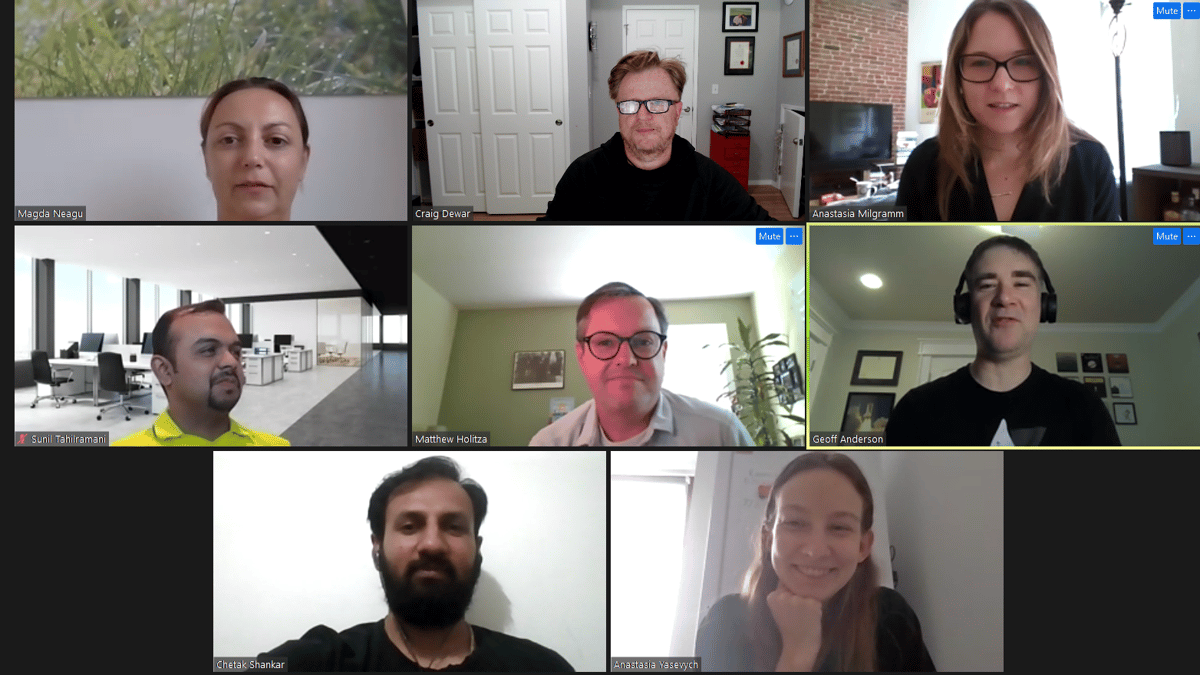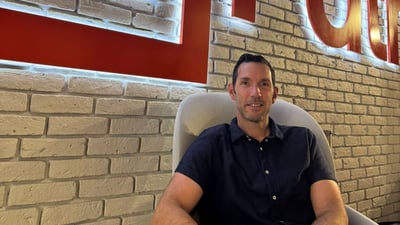Meet the Leaders: Craig Dewar, Director – Product Marketing RPA Platform
Meet the Leaders: Craig Dewar, Director – Product Marketing RPA Platform
Share at:

This series will give you the opportunity to get to know some of the Leaders at UiPath. They are the ones who carry a lot of extra responsibilities on top of overseeing projects and processes. They make sure to hire the right people for their teams. They act like coaches and they support you to become the best version of yourself.
We have some talented colleagues in UiPath. They are passionate, they are resourceful and they're willing to create something that’s never been created before.
We are pleased to introduce Craig Dewar. He joined UiPath in Oct 2018. He is based in the Bellevue office. For those unfamiliar with the area, it’s just outside Seattle in the beautiful state of Washington. Back when he started there were about 20 people crammed into a couple of WeWork offices and there are now about 200 people based in the area so there has been tremendous growth.
He leads the Platform Marketing team inside our Product Marketing organization. The function of Product Marketing sits at the intersection of Product Management, Marketing, and Sales. His team works closely with all these teams. Their main goal in life is to ensure that customers and internal teams understand the unique value of our products and what sets them apart in the market. They understand customer needs and how our products can help, and they translate technical functionality into compelling benefits.
Tell us a bit about your career journey so far. How did you get to where you are today?
I am originally from Wellington, New Zealand. I started off studying science and getting my degree in Physics. Fresh out of university I started my career in tech working for Alcatel as a Developer and Test Engineer on early digital telephone systems. This eventually led to the burgeoning IT field and I then spent a few years running IT for a legal company.
In early 1995 I was lucky to find myself at Microsoft during the early stages of the PC revolution. I worked in Technical Presales primarily focused on Microsoft Office and early server products with finance and government customers. In 2001 I relocated to Redmond, WA because I wanted to get involved in building products and not just selling them. I worked on early mobile products like the Pocket PC, Microsoft Dynamics CRM and ERP, and Windows. I was also involved in launching Windows 10 for commercial customers. In total, I spent 24 years at Microsoft before coming to UiPath and it was an incredibly fun and rewarding experience.
The 18 months so far at UiPath have also been amazing. Learning a new product and market, a new culture, and helping build a new business at a Rocketship start-up has taught me many new lessons.

What was one of the most important turning points of your career? What did you learn from that experience?
One turning point that comes to mind happened during the financial crisis in early 2008. The leader of my business at the time had a leadership offsite where about 50 of the senior managers gathered in person to hear the plan for how we would adjust our business. His basic premise was the crisis was a unique opportunity to aggressively go after share and acquire new customers.
I remember sitting in a big room looking around at my peers seeing lots of nodding heads. I however had a different opinion; we were talking about ERP systems and I believed it would be difficult to get new customers as they would defer big new projects like this. I felt we should focus more on our existing base, making sure they renewed and cross-selling them additional functionality aligned with the response to the crisis.
I raised my hand and shared my point of view. While it was uncomfortable expressing the contrarian view and seemed to fall on deaf ears there was an interesting follow on. About a week later the business leader asked me to a 1 on 1. He shared that he had appreciated the debate and thought about it further.
Most of the resources would go to the original strategy but he had decided to formalize the idea and since I apparently cared about it my new job would be building a customer team to make it happen. I recruited from within the company and we were off and running immediately. Over the next year, we built a new approach, executed it with rigor, and grew the existing customer business by double digits in the height of the recession.
My key learning from this was silence is tacit agreement. If you have a different view you must have the courage of conviction and speak up. The debate of ideas leads to better outcomes.
What made you choose UiPath out of all the other tech companies out there?
The first reason was the people. I was not really looking for a new job or company at the time. Then one day out of the blue Eric Yaeger called. UiPath was building a new product marketing team and the Chief Product Officer, Param Kahlon, has suggested I might be worth talking to. Param and I had worked together in the Dynamics 365 business at Microsoft and I had really enjoyed the experience. I dropped by for an exploratory coffee and to my surprise recognized several other folks I had enjoyed working with in the past. They were building a great team and it looked like it would be fun to be part of it.
As I thought it through, the next thing I looked at was the opportunity. I had worked on some big businesses at Microsoft like Windows and Office and I wanted to be at a company where there was a long future of growth ahead. I looked at the automation market and I believed it would be a large horizontal business with many of the same attributes of Windows or Office. It was applicable to every department, of every company, of every size, in every industry and every geography. There are not many new tech categories like that today.
Next, I dug into the product, pundits like Forrester had already marked UiPath a leader, but I wanted to get hands-on and make sure the technology was excellent and could maintain its position. I downloaded the community version and built some automations. It was easy to use and quite powerful. It was a product I could believe in and get behind as a marketer.
Based on all this I jumped in and I have never regretted it, loving every moment of the journey with UiPath so far.
How would you describe your team? Think of people, projects, mission, anything that somebody looking to join your team should know.
Our team is very diverse and highly distributed. We have team members in Bellevue, Bangalore, Bucharest, Eindhoven, Lviv, New York, and Phoenix. We are spread out this way because the Product and Engineering teams at UiPath are also distributed and we geographically embed the team with the Product organization whenever possible.
Product Marketing Managers (PMMs) do many things but when I think about the best PMMs I have worked with they stand out in one or more of the following areas:
They write well. Very few products can stand on their own, they need PMMs that can explain the benefits they offer and communicate them effectively to customers. The Sales team also relies heavily on effective messaging and great sales content. This requires a blend of technical depth and the ability to write and tailor for the target audience.
They verbally persuade. PMMs spend a lot of time explaining their product and marketing strategies to many key stakeholders including marketing colleagues, sales teams, management, and even customers. The ability to crisply present ideas, be articulate, and persuasive is key.
They artfully market. PMMs must work with and activate the broader Marketing team to deliver on the go-to-market plan for the product. Knowledge and experience in the other functions of marketing is very helpful to build the right plan and work with the team to make it happen across demand generation, social media, digital marketing, and influencer marketing.
They get business. Products drive revenue so PMMs need a clear understanding of revenue projections and how to achieve them. They are close to the pipeline and the big deals. They understand the sales blockers and knock them down. They also think about the broader metrics that matter to the business such as penetration, adoption, and retention.
I am lucky to have people on my team today who have these various skills. They are incredible at what they do, and I am humbled by the chance to lead and learn from them each day.
What's important for you when choosing a new employee? What would you advise candidates who want to interview for a job in your team?
Obviously, functional skills and experience are important but just as important to me are attitude and approach. One thing I look for when I am interviewing in this area is “Yes and”. It comes from an improv adage where you accept what someone is saying with a “Yes” then build on it with an “and”. I love having people on the team with this attitude. Those that look for how they can do something and not why it cannot be done, the “Yes”. Those that build on the ideas of others around them helping the project and ideas move forward, the “And”.

Culture Architect, UiPath
Get articles from automation experts in your inbox
SubscribeGet articles from automation experts in your inbox
Sign up today and we'll email you the newest articles every week.
Thank you for subscribing!
Thank you for subscribing! Each week, we'll send the best automation blog posts straight to your inbox.



